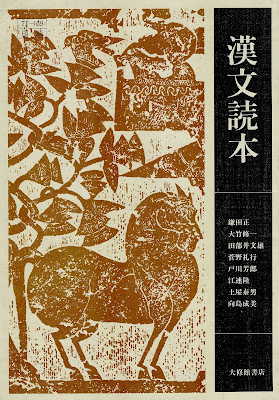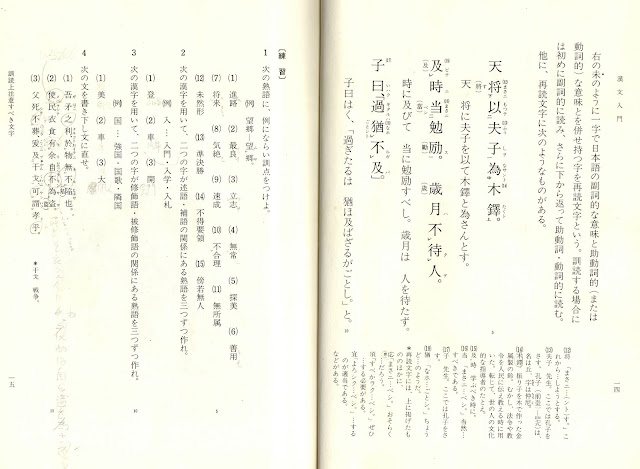このブログを通して一つ明白なことは、俺は真剣に"死ね(処刑)"と言い、彼女たちはその俺を真剣にサポートしているということ。
Wednesday, 4 September 2013
for example
There is a phrase of Chinese character "国史". (こくし・コクシ)(Pronunciation in Japan is Koku-Shi.)
国 is "country" or "nation".
And in this case、史 is ”history”.
So 国史 is "the history of a nation".
Currently、China、Japan、etc.
Among people that use the Chinese characters、pronunciation of this word is probably different.
(This pronunciation may be already not constant in China only.)
But if we look at its Chinese characters、its meaning can be understood.
This might be a feature of Chinese characters as ideograms
・・・・・・・・・
国史 is "the history of a nation".
When I found out the word ”nation” and ”history” in the English-English dictionary.
Nation is "a country considered as a group of people with the same language".
And history is "all the events that happened in the past".
It was written that way.
(One of the commentary of course.)
Although this is a bit extreme、for example.
国史 is the "all the events that happened in the past" of a "country considered as a group of people with the same language".
Japanese seems to have been such a representation method originally.
※Rather than represent it in the idiom one.
※Of course、Japanese grammar is different from English.
※As an expression style.
And they used one Chinese characters to one sound.
This is no easy matter.
"国史・ko-ku-shi".
But if Japanese people use this phrase directly、this two Chinese characters is enough to represent its meaning.
・・・・・・・・・
Note: Today、pronunciation of most Chinese characters of China and Japan is different.
And above all、grammar of Chinese and Japanese is totally different.
And Chinese characters of China has evolve.
Chinese characters called "Simplified". (簡体字・Kantaiji)
Current、probably its Chinese characters will be mainstream in China.
※There may be more than one pronunciation but I do not know now the pronunciation as Chinese.
Chinese characters used in Japan.
It is ”traditional”.
※Japan has simplified Chinese characters considerably as Japan.
To understand the exact meaning of the sentence of Chinese.
Therefore、it may be difficult for Japanese.
※Perhaps the opposite is also true.
※I think Chinese grammar is close to English.
Thursday, 5 September 2013
わたしはあなたをあいしています
There is a sentence of Chinese language "我愛你".(not sentence of Japanese language.)
This is the sense that "I(我) love(愛) you(你)".
According to my memory、grammar of Chinese and English are similar.
But Japanese grammar is totally different.
"I you love."
It is this order in the grammar of Japanese.
When Japanese started to use Chinese characters as the phonetic equivalent、of course、the text of China would have been brought over to Japan.
And of course、Chinese text would have been reading by translated to Japanese.
※At just that time、people who use the characters、I think many of them could read in Chinese.
※Perhaps、until the Edo period、it will not be possible to vocalize、but many people could read Chinese as it(before simplified Chinese).
・・・・・・・・・
To read Chinese as Japanese.
For example "I loveㇾyou."
(ㇾ:This is a sign that turn over the character of the before and after.)
And for characters of two or more. (phrase、person's name etc)
In this case、put a number to Chinese characters.
For example "I love③ Michishige Sayumi②".
But this is incomplete yet as Japanese language.
Postposition is necessary to this sentence.
"I Michishige Sayumi love."
This situation.
"Small punctuation marks is equipped to its text."
"Small punctuation marks equipped its text."
This situation might be close.
Therefore、postposition of character of katakana or hiragana.
It is accompanied.
Incidentally、to、in、at、etc.
These come in the back of a word in grammar of Japanese language.
As an example、it may be hard to understand but.
"I(am) love③ Michishige Sayumi(to)②".
This was the invention of the new Japanese language.
みなさんこんにちは、群馬県の回し者、長崎県民の王子文明でございます。
赤勝て白勝て運動会。40年前には予定されていた2020年の東京オリンピックまであとわずかですが。
平和成ルではなく平和成スだな。
ゴミ(処刑)のニセモノは当然ゴミ(処刑)。
この場合の"オケがいい感じにできる"とは、おれらのことを全く知らない、当然おれらの曲なんか聴いたこともない、聴く義務もない、という人らに、とりあえず一曲通して聴いてもらえるだろう、と、判断できる仕上がりのこと。と、なると、全般的に打ち込み頼りで"驚け"に偏りがちになりますが、そこは時と場合によりけりに余計なお世話で。ま、それもどうだろう、で、コックリさん奏法に向かったトコもありますが(布袋さんへのあこがれが一番の理由)。
烏鵲填河成橋而渡織女。
そりゃわかるがな、そもそもピラミッド設計したのわしやがな(ここは梨緒に、大阪弁、河内弁?こいであっと?)前提で。
陳さんの孔明さんが目指す"天下三分の計"が、米ソ中冷戦の基本構造(本質)です。
以前の繰り返しになりますが、世界中の軍隊は地球防衛軍、つまり自衛隊。愛国心とは他国の郷土愛を尊重すること。当然、無法には地球防衛軍として共同で対処。
鈴井貴之さん、黒い皇帝、ブラックエンペラーの総長をやられていました?
王政復古
Mission for My Country
陳舜臣さんの、です。 表紙がないのは、それだけ読み込んだとおもってもらえれば(詳しくはおぼえてません・笑)。
Heart to Heart
たしか信長さんには梅雨将軍という異名があったとおもいますが(新田次郎さんの創作かもしれませんが・笑)、泥田に馬の足を取られたのは木曽義仲さんでしたか?
天照帝。この、ナイト オブ ゴールド "イリアス"のバスターランチャーで、現在、地球直撃コースで飛来する直径500キロの小天体を狙撃消滅するのがおれとさゆみの最初のお仕事。(V)o¥o(V)。
でびるちゃんずみーとざみらくるつあー2019。
コスタリカ and たしか人を書いた後にサッチャーさんのことをお聞きしたような。
発酵打算私述方向(すいません)。
『オーガロイド』の格闘とはドッグファイトという認識でしょうか?
あのですね、真面目に書きますが、道路交通法順守、道路自体も大丈夫、としても、一歩事に、電柱、信号、歩道橋、などをなぎ倒して行く、と、なると、頭頂高31メートルの巨大ロボットを、少なくとも、日本国内で普通に乗り回す、は、現実的でないですね(山林を一歩々々なぎ倒すのも)。やっぱり、基本、宇宙(戦)用でしょうね。
オーストラリア大陸縦断3,700キロ and Friendship of the Soul.
"その時歴史が動いた 「マッカーサーを叱った男 ~白洲次郎・戦後復興への挑戦~」"
周王国👉邪馬台国でどうでしょう(at 河南)。
おれがそう言ってる(だけ)、で。
拉致被害者、家族、全員死刑つうことで。そーいえば、被爆二世、三世、優生保護法(連合国占領下の日本、そんなファッショ極まる問題法案GHQは何考えて通したの?押し付けられたんじゃない?日本国憲法同様・笑)、楽して金盗ろうと必死だね。処刑されるまで真っ当に働けゴミ。つうてもそんな(同文)。
"言葉"を救出しないと。
海底に沈んだヒエログリフはどんな材質の石材に刻まれて、とか、ありますが、所謂アルファベットって、いつごろ成立した、という建前で?
おれの妻には確認済み。令和元年七月四日以後の"ハロプロ"全員ゴミ処刑。皆殺。
俺と妻はバカが嫌い。令和元年七月十二日以後のお笑い芸人全員ゴミ処刑。皆殺。お笑いごときついでで十分。で、今後、職業ジャンルとしての政治家が必要なのか、俺は疑問を持ちますね。ま、疑問があるなら自分で解決したほうがいいんでしょうが。 - はいはい(笑)。あのですね、今もそうなんだろうけど、今後はもっとシンプル明瞭に、ン十億人単位の実質直接民主制になるだろうなと。それを可能にする条件が整う。俺は造物主だが独裁者ではない。したがってこの世界に"独裁者"は存在できない。俺がありつづけることが民主主義の永遠を担保する。これはもうすぐ終わるけどね(笑)。



































































